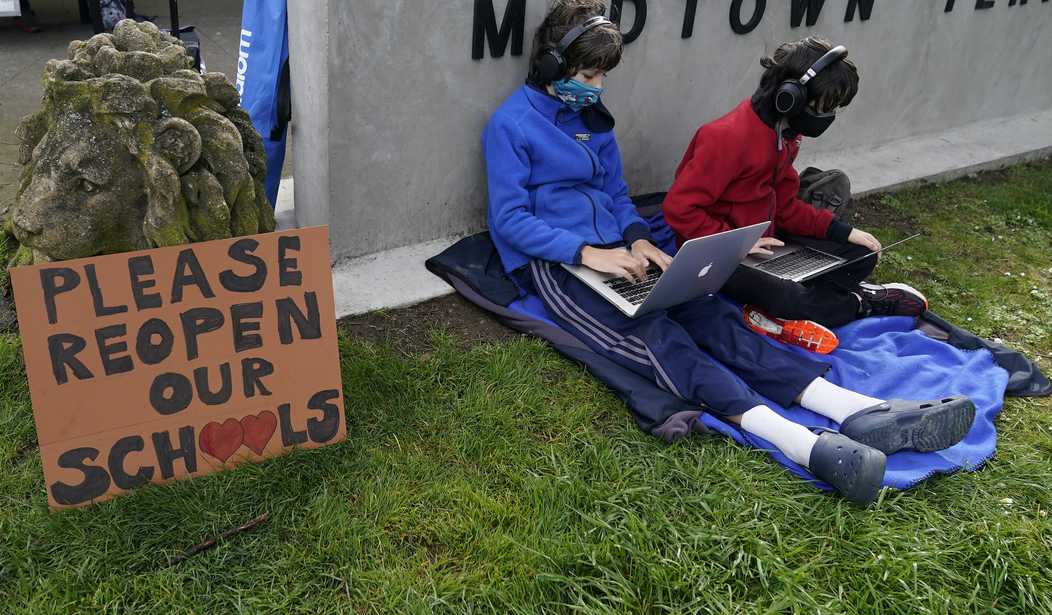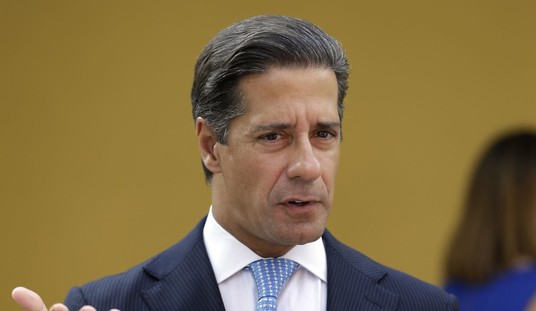Amen, and overdue. While adults finally get to strip off their masks, restrictions on children are remaining in place — even though they are much less vulnerable to COVID-19, especially for serious acute infections. Bloomberg science columnist Faye Flam accuses the adults of using kids to protect themselves, and declares that enough is enough:
So while adults may celebrate going back to their normal lives, we’re still asking kids to observe all the rules of pandemic life.
They’ve been taken out of school or made to take extraordinary precautions there, isolated from their friends, deprived of many sports and other activities, and made to endure mask-wearing and social distancing, even outside. Add to that the hardships their families have faced from the economic disruption caused by the pandemic.
And they’ve done it all to protect older people. The death rate from COVID-19 is 3,200 times higher in seniors than in children. For kids, the disease is comparable to influenza.
Because adults are all now eligible for the vaccines — and have been for at least a month in most places — it’s time stop asking kids to make sacrifices to protect older people.
This has been the dirty little secret of school shutdowns and masking kids in camps, and so on. None of the science suggests that children are vectors for the disease; data from around the world suggests just the opposite, especially when employing some basic distancing and common sense responses to symptomatic individuals. It’s always been about protecting the adults by burdening the children.
And for a while, that made some sense, especially before we had enough data to reliably model for vectors. Children often are vectors for other infectious diseases, such as colds and flus, and the intense density of most American classrooms would suggest that a highly infectious novel virus would run rampant through schools. Even if the children themselves remained largely asymptomatic, no one knew if they would pass the virus off to more vulnerable adults in the same household bubbles, especially elderly family members.
A year ago, these were rational precautions. Over the summer of 2020, children would largely have been out of school anyway. Beginning in the fall, though, the data clearly showed that schools which remained open did not generate cascades of infection, even among adults connected to the children. Some states that reopened provided even more data along those lines. And yet, we continue to impose restrictions on children not for their health, but for the adults around them — without much evidence that it matters, if any at all.
Flam points out the absurdity of imposing health measures on one population without any benefit to them:
The only restrictions on kids should be ones that protect kids — and there should be at least some minimal amount of evidence that such restrictions would help. Children have already been put through far too much in the name of protecting adults. …
The better way to protect kids is for adults to step up and get the vaccine. That’s right — after 15 months of asking kids to sacrifice to save older lives, it’s time for older Americans to do their part for the kids.
Now that adults have near-instant access to vaccines in the US, even the academic argument is moot. The people who even theoretically benefited from childrens’ confinement now need to fulfill their end of the bargain. If adults don’t want to vaccinate, that’s their choice, but children should not be held hostage to it. Reopen the schools, take off the masks, and get these children their lives back.
Addendum: If you don’t do it for the kids, do it for the cash:
Ohio Gov. Mike DeWine’s $5 million lottery to encourage vaccinations appears to be an early win.
State health officials said Monday that more than 25,400 Covid-19 vaccine shots were administered Friday, two days after the program was announced, making it the highest vaccination day in three weeks.
Maybe more telling were the people who got vaccinated. Vaccinations for residents ages 30 to 74 spiked by 6 percent after weeks of steady decline.
“Not only have we achieved our goal of increasing public awareness and interest, but we have slowed what was a consistent decline, and in certain age groups we’re seeing an increase again,” state Health Director Stephanie McCloud said. “This is doing exactly what we intended it to do.”
Whatever works, man. Whatever works.








Join the conversation as a VIP Member